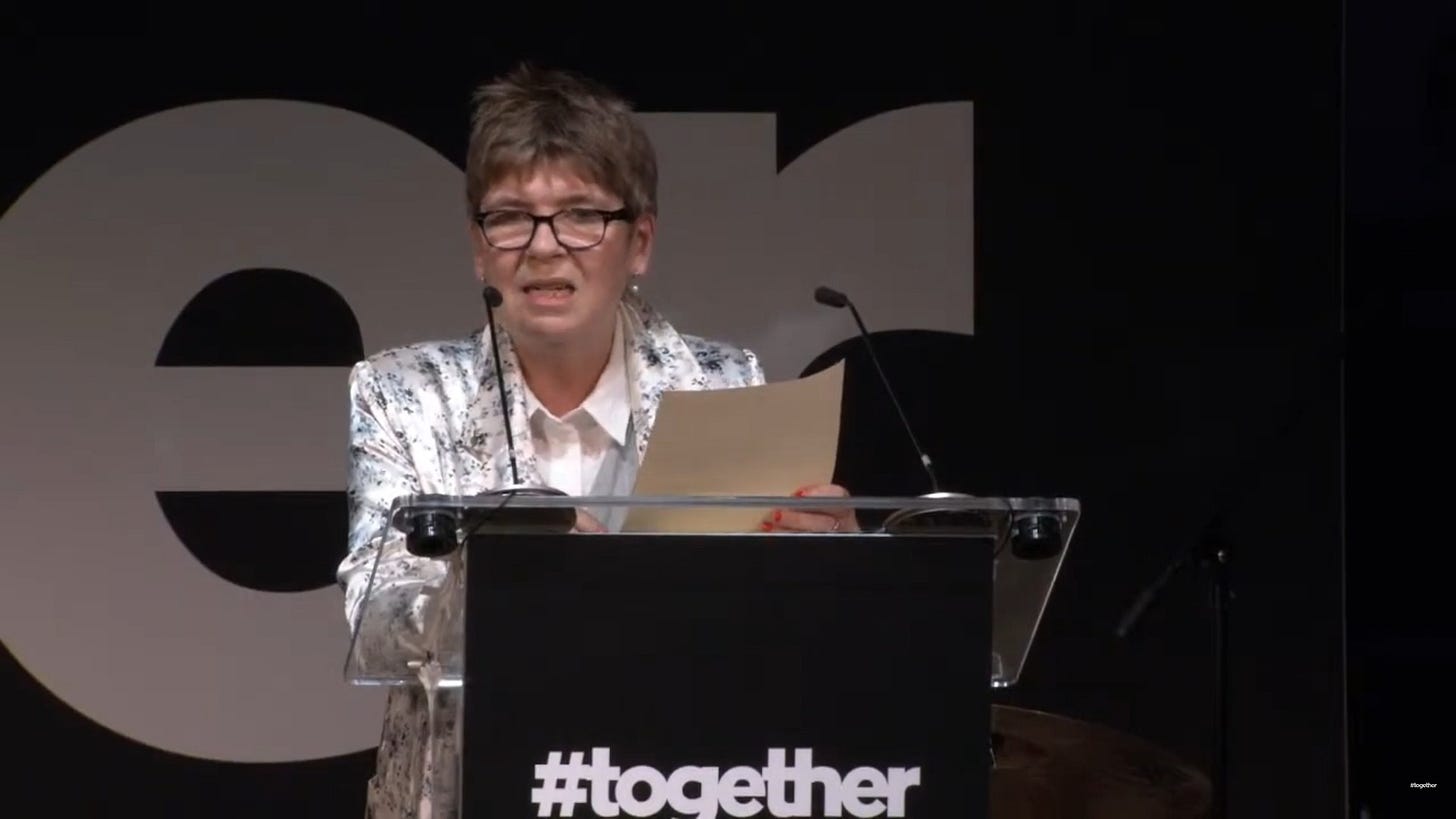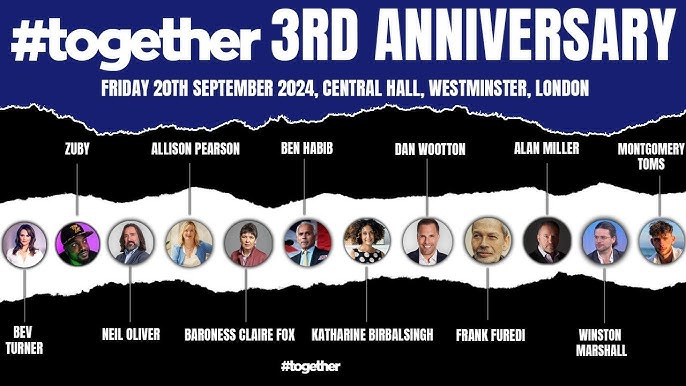Together we stand
Real free-speech bravery is holding our nerve, reclaiming our language, exposing double-standards and arguing against bad ideas. Read Claire Fox's speech from Together's recent anniversary gathering.
Last week, at the event marking the third anniversary of the campaign Together, I spoke on the topic of free speech and courage. It was to a packed audience - credit to Alan Miller and the team for getting so many people together. It was an evening featuring themes that are especially important to us at the Academy of Ideas and reflecting many of the issues which will come up at the Battle of Ideas festival in a few weeks’ time. There were some fantastic panels and speeches, and you can watch a film of the whole evening here.
Below is a transcript of my speech. Alan will be chairing a session titled From smoking bans to junk-food restrictions: where’s the evidence? at the festival, and speaking on a session titled From riots to shoplifting: dealing with lawlessness. Paid subscribers to this Substack get discounted tickets - upgrade your subscription now. And if you’ve not got the cash for it, why not volunteer with us for free access - head to this link to sign up.
If you can’t play the video, watch the speech on YouTube here.
Some excellent speeches before me have concentrated on courage. I am going to conversely share some reflections on cowardice.
In recent weeks, some Oxford dons revealed that their students are too scared of negative reactions from their peers to speak their minds in seminars. It’s tempting to mock this as an example of Generation Snowflake. I mean, if privileged students are frightened to talk about novels or archaeology or whatever in the safety of their cozy, Ivory Tower tutorials, they are unlikely to storm the barricades or speak truth to power.
But rather than moan about the ‘yoof’ of today or how wimpy Gen Z are, let’s be honest. Many of us ‘grown-ups’ also bit our lips and self-censor. Take tonight. ‘Come and speak at the third-anniversary bash for Together’’, Alan Miller said. ‘It’s on the theme of courage and free speech.’ ‘What’s not to like?’, I mused – just stand up and deliver a rousing call to arms… except, let me tell you, I’m actually not feeling so brave tonight.
Why? Because these days, speaking freely and frankly is quite nerve-wracking. It’s so easy to mis-speak, use an ill-chosen word, say the wrong thing. Not only will people say ‘I find that offensive’; in these febrile times, with a vogue for public shaming, you can be ostracised from public life by an edited clip on X. You can be labelled a bigot for a clumsy verbal mistake; lose your livelihood for others wilfully misreading your good-faith opinions. Worse, as has become far too clear since the riots – it’s not even an exaggeration to say that you could end up in court or jail for what others dub hate or misinformation.
This policing of what we say creeps into everyday life, into workplaces, when we pick up the kids from school. So many institutions that provide services to us, or where we’re employed, now have prescriptive language codes. We all live in dread of some rainbow lanyard-wearing apparatchik asking the infamous pronoun question. She/her you might reluctantly mutter when what you want to say – shout – is ‘Isn’t it obvious? I’m an adult, human female, you numpty.’ But to be frank, perhaps we might not be so brazenly outspoken if the person standing in front of us is from HR. We Gammon/ TERFS/Deplorables don’t stand a chance of getting through a sentence without being reprimanded for mis-speaking.
My workplace is rather unusual, but guess what, policing speech is fashionable there, too. When we went back to the House of Lords after the Summer Recess, we all received a WELCOME letter from the new government and whips. How lovely and considerate. Except it was more like a passive-aggressive warning. To quote: ‘As the House considers and debates the difficult issues that the country faces… it’s especially important that debate does not descend into vitriol, use of false facts, or use of rhetoric designed to offend and inflame.’ What? So, when the Labour government announce they’ve scrapped the winter fuel allowance (based on the ‘false facts’ of a previously unknow fiscal black hole) or Education Secretary Bridget Phillipson tears up the democratically passed Higher Education (Free Speech) Act, dismissed falsely as a ‘Tory hate speech charter’, aren’t we allowed to vitriolically condemn them? Are we meant to smile sweetly and nod along in case anyone is offended?
What’s frustrating about this sanitising and policing of our speech is that language and words – the very weapons we need in the battle of ideas – are being turned against us, used to shoot us, the messengers. No wonder it’s easy to become tongue-tied. Never mind walking on egg shells, it’s like talking on egg shells.
Then there’s the bastardisation of words used to denounce any of those who dissent, to demonise anyone who won’t be compelled into conformity, Ever growing numbers, as we have heard, are promiscuously labelled far-right, Nazi, racist. Not only is it unpleasant to be subject to such false epithets, it also creates two serious problems for our ability to discuss issues freely. Firstly, we lose control over the specific meaning of those words. And secondly, those words become cheapened and trivialised, so losing their power to shock and describe.
Recently we heard that libraries across Labour-run Wales (that, by the way, face swingeing cuts) are sending staff on expensive ‘critical whiteness studies’ courses, and there’s an elaborate, detailed, colour-coded manual of racist buildings that librarians should avoid meeting in. It’s beyond satire.
However, the bigger problem is that there are REAL racists and white ethno-nationalists, even a small but nasty current of far-right groups – all who disparage people based on skin colour. I want to call them out and say, ‘That’s racist!’, etc. But if the word is inappropriately used to stigmatise everyone from concerned citizens condemning the grooming gangs to Welsh librarians, then I’m deprived of the ability to name and shame. Robbing us of the meaning of such words is another form of censorship.
Rows over words have now become a regular feature of political life. One recent case saw a bizarre dispute amongst the media, political and legal classes about whether calling a black person a ‘coconut’ was a racial slur. Of course it is, in my opinion – I mean mocking someone as black on the outside, and white on the inside implying they are a race traitor who tamely dances to their white master’s tune because they don’t agree with today’s critical-race orthodoxies. YUK! But regardless, how should we respond when people use obnoxious abuse?
This linguistic row made the headlines when Marieha Hussain was up in court for carrying a placard depicting Suella Braverman and Rishi Sunak as coconuts. She was found not guilty of a racially aggravated offence. We free-speechers should have cheered. Instead, too many were outraged, and demanded she was jailed. For a ‘speech crime’. Some even celebrated when Hussain’s high-profile supporter Kehinde Andrews, a professor of Black Studies, was arrested after a mob-handed visit at home by the West Midlands Police. His crime? Labelling someone a ‘house negro’ on X. When I objected to ‘our side’ endorsing the forces of criminal justice interfering in what people post online, lots of people turned on me and accused me of being ‘lily-livered’. They proclaimed: ‘It’s time to stand up for ourselves and stop cowering.’
Listen, I get the frustration about two-tier justice and how galling it is to hear Hussain’s and Andrews’s supporters – usually so keen to use cancel culture against us – suddenly claiming the protection of free-speech rights for their own detestable, racialised abuse. BUT, however infuriating it is to be gas-lit by these so called anti-racists (another word that has been corrupted and stolen from us), we shouldn’t stoop to their censorious tactics. We rightly condemn identitarian social justice warriors or the police – (too often interchangeable) – for scouring social media looking for transgressors to round up and prosecute. It isn’t brave to respond by doing the same and indulging in tit-for-tat cancellations, demanding our opponents are arrested or sacked for speech crimes. We shouldn’t let them, or our own defensiveness, turn us all into snitches.
That very freedom that is so precious to all of us here tonight, is only meaningful if it’s extended to EVERYONE, including those who’s toxic worldview we despise. Real free-speech bravery is holding our nerve, reclaiming our language, exposing double-standards and arguing against bad ideas. We’ll only win this battle of ideas through more and better speech, but we’ll never win if we resort to our own brand of censorship, which is the very epitome of cowardice.



